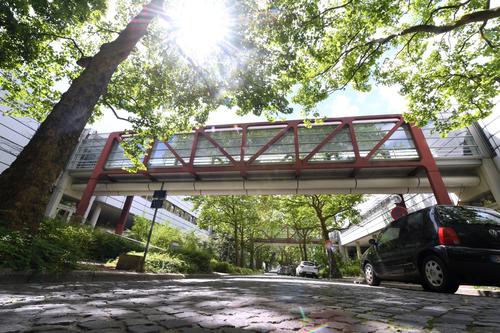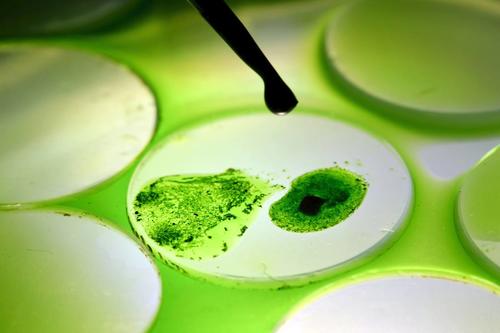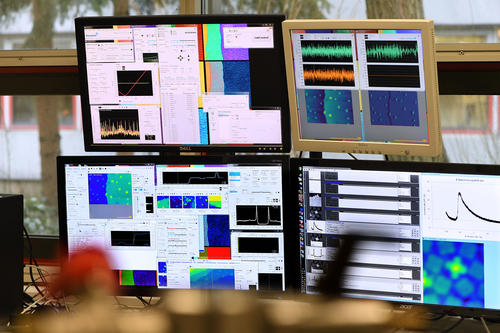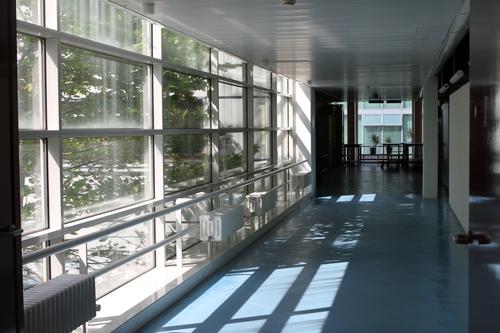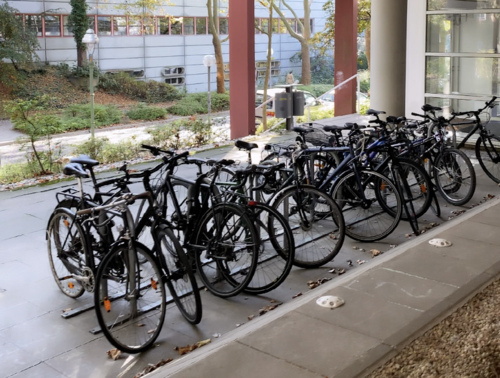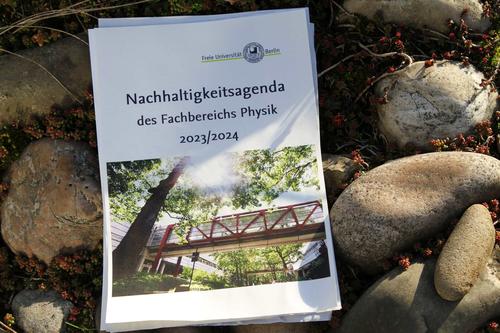Sustainability at the Department of Physics at Freie Universität Berlin: First Sustainability Agenda Approved
Fachbereich Physik - Freie Universität Berlin
Image Credit: David Ausserhofer
Biophysik-Labor
Image Credit: FB Physik, David Ausserhofer
Messdaten im Physiklabor an der Freien Universität Berlin
Image Credit: FB Physik, David Ausserhofer
gebäude-nachhaltig
Image Credit: FB Physik
Am Fachbereich Physik an der Freien Universität Berlin
Image Credit: FB Physik
Fahrräder vor dem FB Physik
Nachhaltigkeitsagenda
Image Credit: FB Physik
The Department of Physics adopted its sustainability agenda on February 1, 2023. The agenda was developed in a participatory process by the Sustainability Working Group. The document proposes a number of measures ranging from the design of new interdisciplinary courses dealing with sustainability issues to the calculation of the department's carbon footprint and the reduction of official air travel.
News from Feb 20, 2023
Freie Universität Berlin declared a climate emergency in 2019 and set itself the goal of becoming climate neutral by 2025. In this context, the Sustainability Working Group was established at the Department of Physics in 2020, in which all department members – students, lecturers, and employees – can participate.
We would like to briefly present the agenda and some projects and initiatives of the Physics Department.
Biophysical research for green energies
A number of research groups are working on fundamental biophysical principles that are necessary to develop so-called "green energies". Scientists are investigating substances, methods and models that can contribute to the development of novel renewable energies and fuels.
- Research Group Behrends: Organic radical batteries, organic solar cells
- Research Group Bittl: Use of EPR spectroscopy to explore the functioning of solar cells
- Research Group Dau: Catalysts for the production of non-fossil fuels, artificial photosynthesis
- Research Group Heyne: Light-induced hydrogen production 'SunHy'.
- Research Group Lips (HZB): Semiconductors and organic materials for solar energy conversion and storage
- AG Roldán-Cuenya (FHI): Development of electrocatalysts for the cost-effective production of fuels and valuable materials from water and CO2
Research with a focus on sustainabilty
CO2nduct – scientific method for academic self-monitoring
The framework 'Scientific CO2nduct' was created in 2020 in the working group of Prof. Dr. Jens Eisert. Group members calculate the CO2 footprint of their scientific work, publish the footprint with their publications, and voluntarily compensate for the CO2 emissions incurred from the funds of the working group or through private means.
Scientific CO2nduct was introduced to the international physics community in a publication in Communication Physics in June 2022 and has since gained acceptance in scientific circles, especially among theoretical physicists. It remains exciting to see how well the initiative can be applied in the scientific routine of experimental physicists and when it can become a standard procedure in science.
https://doi.org/10.1038/s42005-022-00930-2
More sustainability topics in physics teaching
An increasing number of courses in undergraduate physics programs include topics designed to equip students to deal with sustainability issues and provide them with fundamental knowledge for designing sustainable innovations.
For example, in the general professional skills module "Exploring Sustainability," tought by Professor Holger Dau, students can learn about scientific and technical fundamentals of artificial photosynthesis.
The module "Analytics for Photovoltaics" by Professor Klaus Lips covers general principles of climate change and deals with solar energy conversion and the analysis of specific material and component properties.
Prof. Dr. Roland Netz explains in several theoretical courses, among other things, the thermodynamic fundamentals and the computer-aided methods with which thermal conductance values and efficiencies of heat engines and heat pumps can be calculated.
Some more sustainability-related courses are tought in cooperation with different institutes of Freie Universität Berlin, e.g., the Institute of Chemistry, or other universities, e.g., Technical University Berlin, and are very well received by students. One example is "Making Green - The Sustainability of Consumer Products". New courses related to sustainability are being designed throughout the university.
Courses focusing on sustainabilty
Physics Education - Impulses for Sustainability Education in Schools
The working group of Professor Volkhard Nordmeier - Didactics of Physics - offers student teachers a teaching-learning laboratory on climate change. In addition, the internet platform Sonnentaler, provides materials that specifically aim at teachers of primary and lower secondary schools. On the platform, teachers will also find the latest IPCCs reports (Intergovernmental Panel on Climate Change) in German, for example, "1.5°C global warming" and "Ocean and cryosphere".
Sustainability Working Group at the Department of Physics - born out of student initiative, supported by the cross-section of the department
The Sustainability Working Group was established in 2020 at the Department of Physics to accelerate the achievement of climate neutrality at the university. For this purpose, an agenda with a catalog of measures was developed.
On behalf of the Department's council, the working group started a department-wide discussion process on various topics in July 2021. CO2 emissions, business trips, digital event formats, joint use of research facilities - these and many other topics were discussed at 21 meetings, resulting in a catalog of measures, ideas and guidelines to be strived for.
Department's Sustainability Agenda
The proposed sustainability agenda was discussed in two department meetings and adopted on February 1, 2023. The proposed measures range from everyday "little things" such as the replacement of light bulbs and the voluntary renunciation of air service trips to proposals to establish an additional cross-departmental sustainability professorship and to have review meetings such as ERC status meetings take place exclusively online.
The agenda articulates missions for 2023 and 2024. The tasks fall under different areas of responsibility: Dean's Office, Department Administration, Energy & Sustainability Office, IT, Purchasing and others.
The sustainability agenda is also intended to serve as a source of inspiration for all members of the department - for them to critically review academic activities and ways of working at the university and to take responsibility for making them more sustainable. All with one big goal - to achieve climate neutrality as quickly as possible.
Sustainability Agenda 2023-2024
Keywords
- climate
- climate neutrality
- co2nduct
- ecological
- research for sustainability
- sustainability
- sustainable
- sustainable education
- sustainable science
- teaching sustainability
- working group


